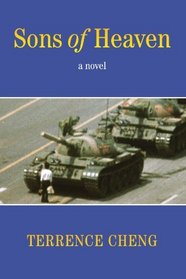The image of a young man in facing down a tank is turned into a compelling story of two brothers, one part of the regime's ideology, one Americanized by his college experiences. Taut and heart-breaking.
quality fiction book about a historical event.
From Publishers Weekly
Centering around the Tiananmen Square massacre and its aftermath, this remarkably structured and textured debut epic seeks to attach a face to the mysterious man who, by stepping in front of the rolling army tanks, became the most recognizable symbol of the massacres. Cheng succeeds in his endeavor, and in the process he gives China a face as well¢one so vivid and provocative it's hard to walk away without a fresh impression of the massacre, the 13 years since, and modern-day China in general. Three months before the massacre, Xiao-Di returns to China after spending four years at Cornell University, where he fell in love with a blonde American girl who left him upon graduation. But he has tasted freedom and his return to China is turbulent. He cannot find work. He grapples with the way the masses adhere to tradition and respect authority. He lives with his grandparents (his parents are dead) and when not at home feeling angry and confused, he is out with his friend Wong, bleakly contemplating the future. Then, through the eyes of president Deng Xiaoping, we enter Tiananmen Square, where students have begun protesting. Cheng successfully humanizes the person he has called a complicated man, driven by a genuine passion to create a better society for the Chinese people. Xiao-Di soon finds himself impulsively partaking in a hunger strike and, before long, facing down a tank. Complicating matters is his brother, Lu, a Chinese soldier who is sent with a unit to find Xiao-Di. Through the brothers and their grandparents, a multifaceted and sophisticated portrait of the Chinese people is rendered. This is a rare find: historical and political without being pedantic, and briskly entertaining without being cheap, simplistic or contrived.
Centering around the Tiananmen Square massacre and its aftermath, this remarkably structured and textured debut epic seeks to attach a face to the mysterious man who, by stepping in front of the rolling army tanks, became the most recognizable symbol of the massacres. Cheng succeeds in his endeavor, and in the process he gives China a face as well¢one so vivid and provocative it's hard to walk away without a fresh impression of the massacre, the 13 years since, and modern-day China in general. Three months before the massacre, Xiao-Di returns to China after spending four years at Cornell University, where he fell in love with a blonde American girl who left him upon graduation. But he has tasted freedom and his return to China is turbulent. He cannot find work. He grapples with the way the masses adhere to tradition and respect authority. He lives with his grandparents (his parents are dead) and when not at home feeling angry and confused, he is out with his friend Wong, bleakly contemplating the future. Then, through the eyes of president Deng Xiaoping, we enter Tiananmen Square, where students have begun protesting. Cheng successfully humanizes the person he has called a complicated man, driven by a genuine passion to create a better society for the Chinese people. Xiao-Di soon finds himself impulsively partaking in a hunger strike and, before long, facing down a tank. Complicating matters is his brother, Lu, a Chinese soldier who is sent with a unit to find Xiao-Di. Through the brothers and their grandparents, a multifaceted and sophisticated portrait of the Chinese people is rendered. This is a rare find: historical and political without being pedantic, and briskly entertaining without being cheap, simplistic or contrived.




